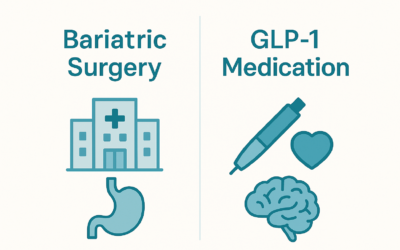The surprising science behind food noise, cravings, and more
GLP-1 and GLP-1 medications are everywhere right now, making headlines in both the weight loss world and diabetes treatment space. But while most people know these medications help regulate blood sugar and reduce appetite, what they do to the brain is even more interesting — and it explains why they work so well.
When people talk about GLP-1, they might mean one of two things:
- GLP-1, the natural hormone your body produces in response to eating.
- GLP-1 medications like Ozempic, Wegovy, and Mounjaro, which mimic this hormone but last much longer and have much stronger effects.
Both influence hunger, cravings, and even how your brain processes rewards, but they don’t work in exactly the same way. That’s why taking a GLP-1 medication can feel very different from just relying on your body’s natural GLP-1 response.
So, what does GLP-1 do to the brain, exactly? And why does it make weight loss easier? It’s not magic. It’s science.
What does GLP-1 do to the brain naturally? The science behind the hormone
Most people think of GLP-1 as just a gut hormone, something your body releases after you eat to help with digestion. But that’s only part of the story. GLP-1 isn’t just working in your stomach or your gut — it’s working in your brain, too.
One of GLP-1’s biggest jobs is controlling hunger. Deep inside your brain, in a part called the hypothalamus, GLP-1 gets sent out as a messenger that tells you when you’ve had enough food. It’s like a natural brake on your appetite, helping to slow things down so you don’t keep eating when you don’t actually need to.
But hunger isn’t just about how full your stomach is —i t’s also about how your brain processes food-related thoughts. GLP-1 doesn’t just tell you to stop eating; it reduces the urge to think about food all the time. This is why some people with naturally lower levels of GLP-1 tend to feel obsessed with eating, while others don’t seem to give food much thought at all.
And GLP-1 isn’t only about appetite. It also plays a role in memory and learning, and some researchers believe it might even help protect the brain from damage as we age. There’s growing evidence that it could lower the risk of Alzheimer’s and other neurodegenerative diseases, which is why scientists are looking at GLP-1 medications as possible treatments for conditions that have nothing to do with weight loss or diabetes.
The bottom line? GLP-1 isn’t just about digestion or blood sugar — it’s actively influencing your brain in ways that affect hunger, cravings, and even long-term brain health. And that’s why the effects of GLP-1 medications are so powerful.
What does GLP-1 do to the brain when you take a GLP-1 medication?
Most people hear about GLP-1 medications in the context of weight loss or diabetes treatment, but their effects go much deeper than that. These medications don’t just change the number on the scale — they change what’s actually happening inside your brain. And that’s exactly why they work so well for so many people.
Your body makes GLP-1 naturally, but it doesn’t last very long. The moment GLP-1 is released, enzymes in your body start breaking it down, clearing it out before it can have any long-term effects. That means your natural GLP-1 does its job — helping to regulate appetite and digestion — but only for a short window of time. Before you know it, those hunger and craving signals start creeping back in.
That’s where GLP-1 medications like Ozempic, Wegovy, and Mounjaro come in. These medications mimic the natural GLP-1 hormone, but with one key difference: they stick around much, much longer. Instead of disappearing within minutes, like the GLP-1 your body makes on its own, these medications linger in the bloodstream for hours or even days, continuously reinforcing the same anti-hunger and craving signals over and over again.
But hunger is only half the story. GLP-1 medications don’t just affect appetite — they change the way your brain processes food and cravings at a chemical level. So what does GLP-1 do to the brain to make all of this happen? That’s where things start to get really interesting.
What does GLP-1 do to the brain’s hunger signals? Why food noise disappears
Hunger isn’t just about an empty stomach—it starts in the brain. And for some people, it never really stops. If you’ve ever felt like you’re thinking about food constantly, like cravings take up way too much space in your head, or like you’re always hungry no matter what you eat, you’re not imagining it.
That’s where GLP-1 comes in.
One of the biggest ways GLP-1 affects the brain is by working directly on the hypothalamus, the part that controls hunger signals. When GLP-1 levels are high, the hypothalamus sends out fewer “eat now” signals and more “you’re full” signals. But when GLP-1 levels are low—or when your brain isn’t responding to it properly—those hunger signals don’t shut off like they should. That’s why some people feel like they could eat all day and never feel truly satisfied.
GLP-1 medications supercharge this process. By keeping GLP-1 levels high for longer periods, they make hunger signals weaker and satiety signals stronger. This is why people on GLP-1 meds say they don’t just eat less—they actually feel full faster and stay full longer. It’s not a trick or a placebo effect. Their brain is literally processing hunger differently.
But the biggest shift people notice isn’t just feeling full faster—it’s the silence.
That constant hum of food thoughts? The mental battle over what to eat, when to eat, or whether you should eat at all? It’s just… gone. People on GLP-1 meds often describe it as food noise disappearing, like someone turned down the volume on their cravings. For the first time, food isn’t controlling them — they’re in control of food.
And that’s just from changing hunger signals. What happens when GLP-1 affects the brain’s reward system — the part that decides how good food makes you feel? Let’s take a look.
What does GLP-1 do to the brain’s reward system? The dopamine connection
Hunger isn’t the only thing that drives people to eat. If it were, nobody would overeat when they’re already full, and nobody would crave a specific food when plenty of others are available. There’s another force at play—the brain’s reward system.
Food doesn’t just fuel the body—it triggers pleasure. When you eat something delicious, your brain releases dopamine, a chemical that makes you feel good and reinforces the behavior. This is why people crave high-calorie foods like pizza, ice cream, or chips instead of, say, plain chicken breast or celery. The more rewarding a food feels, the stronger the drive to eat it.
For some people, though, this system is too active. Their brain responds to food—especially sugar, fat, and processed carbs—with an extra-strong dopamine release, making certain foods feel nearly impossible to resist. This can lead to binge eating, compulsive snacking, and food addiction-like behavior.
GLP-1 medications dampen this response. They reduce the brain’s dopamine spike after eating, making highly processed or high-calorie foods feel less intensely rewarding. People often find that the foods they used to crave just don’t have the same pull anymore. It’s not that they don’t like them—it’s that they don’t feel the same overwhelming urge to eat them.
This effect goes beyond food. Early research suggests GLP-1 medications may reduce addictive behaviors in general, including smoking, alcohol use, and even compulsive gambling. Scientists are still studying exactly how and why this happens, but the connection is promising.
If hunger is what makes you eat, and dopamine is what makes food feel rewarding, then GLP-1 is changing both sides of the equation. This is why the effects of these medications go far beyond simple appetite suppression.
What does GLP-1 do to the brain beyond weight loss? The unexpected benefits
Most people taking GLP-1 meds are focused on one thing: weight loss. But as scientists study these medications more closely, they’re finding effects that go far beyond appetite and cravings. GLP-1 doesn’t just change how the brain processes food—it may also influence mood, memory, and even long-term brain health.
One of the most promising areas of research is GLP-1’s potential role in protecting the brain from neurodegenerative diseases like Alzheimer’s and Parkinson’s. Some studies suggest that GLP-1 may help reduce inflammation in the brain, improve cognitive function, and even slow the buildup of plaques linked to Alzheimer’s. Researchers are now testing GLP-1 medications as possible treatments for these conditions, separate from their role in weight loss and diabetes management.
There’s also evidence that GLP-1 medications may have antidepressant-like effects. Some people on these medications report feeling more emotionally stable, less prone to mood swings, and even experiencing a noticeable improvement in their overall well-being. Scientists aren’t entirely sure why this happens yet, but it could be linked to GLP-1’s ability to regulate dopamine and other neurotransmitters that influence mood.
And then there’s impulsivity. People on GLP-1 meds often describe feeling more in control—not just over food, but in other areas of life, too. There’s ongoing research into whether these medications might help with impulse-related conditions like ADHD, substance abuse, and compulsive behaviors. While the science isn’t settled yet, early findings suggest that GLP-1 may play a broader role in self-regulation and decision-making.
In short, GLP-1 medications do much more than help people eat less. Their effects on the brain could have huge implications for mental health, cognitive function, and disease prevention. And as research continues, we may just be scratching the surface of what these medications can do.
So, what does GLP-1 do to the brain? A whole lot more than you’d expect
For decades, the focus of weight loss medications has been on the body—suppressing appetite, speeding up metabolism, or blocking fat absorption. But GLP-1 medications are different. They aren’t just working on the stomach or the gut; they’re working directly on the brain, changing how it processes hunger, cravings, and even rewards.
This isn’t just about making it easier to eat less. It’s about removing the constant, exhausting battle with food that so many people struggle with every day. It’s about quieting that mental tug-of-war between what you want to eat and what you think you should eat. For many, it’s the first time they’ve ever felt truly in control of their own hunger.
And then there are the unexpected benefits—better emotional balance, improved impulse control, and the possibility that these medications could help protect the brain in ways we don’t fully understand yet. The research is still ongoing, but one thing is clear: GLP-1 is doing something remarkable inside the brain.
We’re only beginning to scratch the surface of what these medications can do. But if there’s one takeaway, it’s this: GLP-1 meds don’t just change your weight. They change your brain. And for many people, that changes everything. Learn more about Claya’s weight loss treatment programs for medically supervised weight loss and start your own GLP-1 journey.



